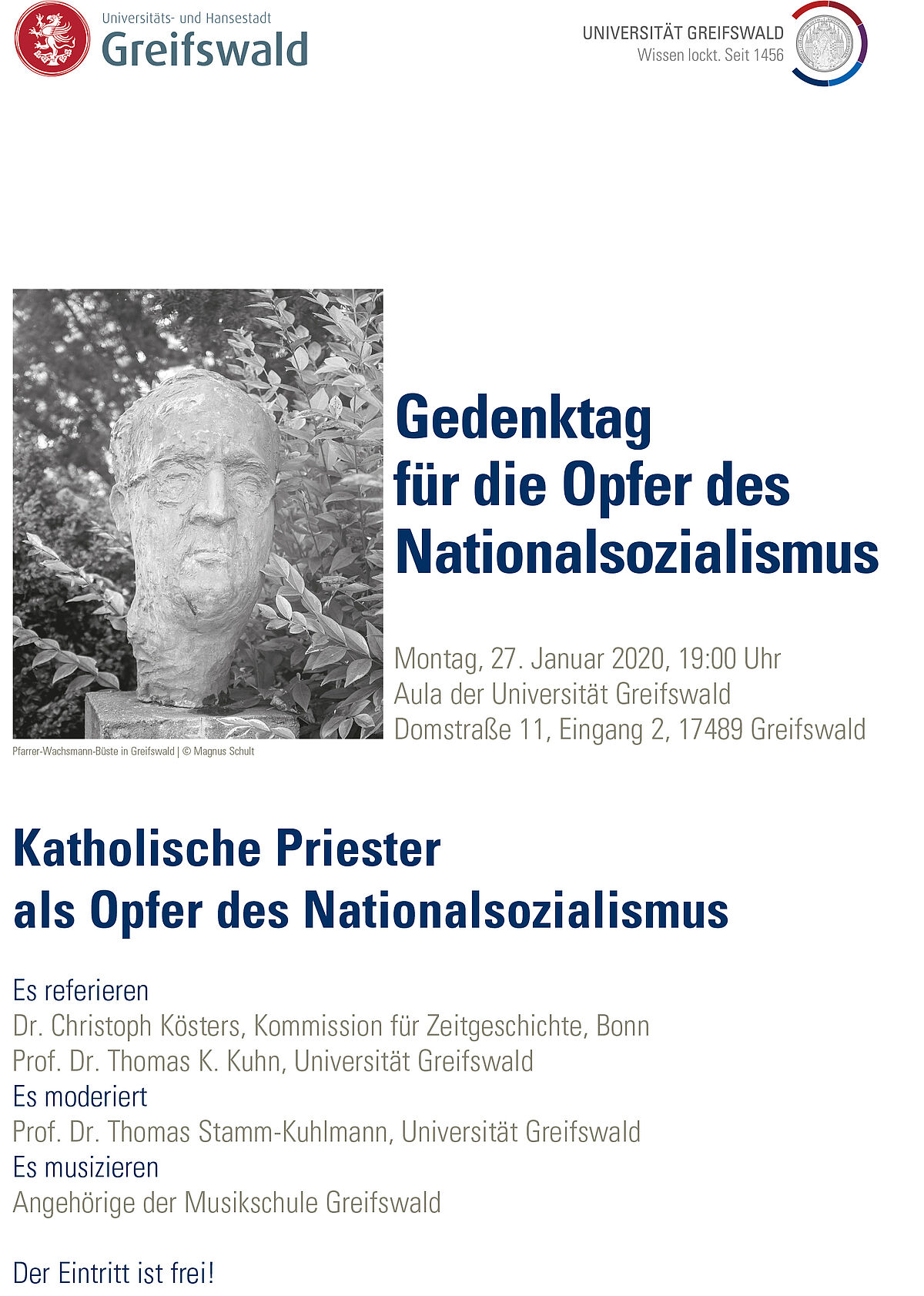Day of Remembrance for the Victims of National Socialism
The University of Greifswald and the University and Hanseatic Town of Greifswald invite members of the public to the Day of Remembrance for the Victims of National Socialism.
Monday, 27 January 2020. 7.00 p.m.
Aula of the University of Greifswald
Domstraße 11, Entrance 2, 17489 Greifswald
Talks will be held by Dr. Christoph Kösters (Kommission für Zeitgeschichte KfZG, Bonn) and Prof. Dr. Thomas K. Kuhn (University of Greifswald).
The host for the evening will be Prof. Dr. Thomas Stamm-Kuhlmann (University of Greifswald).
Music will also be performed by members of Greifswald’s music school.
Soviet troops liberated the survivors of the Auschwitz concentration camp on 27 January 1945. It was here that approximately one million people had been cruelly tortured and murdered, because they did not correspond to an ideology based on racial supremacist fanaticism or, because they had refused to comply with the Nazis. Ever since Federal President of Germany Roman Herzog established the Day of Remembrance for the Victims of National Socialism in 1996, the University and University and Hanseatic Town of Greifswald have dedicated the 27 January of every year to a particular group of victims. This year’s event commemorates the persecution of Catholic priests.
In spite of an agreement between the Holy See and the national socialist government, known as the Reichskonkordat, which guaranteed the self-government of the Catholic Church, the persecution of undesirable Catholic laymen and clergy in the ‘Third Reich’ began at the latest with the introduction of the Heimtückegesetz (Treachery Act) in 1934. After Pope Pius XI had finally condemned the ideology and politics of National Socialism in his German encyclical ‘Mit brennender Sorge’ (‘With Burning Concern’), the persecution of Catholic priests took on a new dimension that led to the creation of a ‘priest block’ at the Dachau concentration camp.
Christoph Kösters (Bonn) will outline this persecution within the boundaries of the Third Reich before Thomas K. Kuhn (Greifswald) gives an account of the fate of Greifswald’s parish priest Alfons M. Wachsmann, who was executed on 21 February 1944 at the Brandenburg-Görden Prison. A musical supporting programme will be performed by members of Greifswald’s music school.
Speakers
Dr. Christoph Kösters has been a research fellow at the Research Center of the Kommission für Zeitgeschichte in Bonn since 1994. He completed his doctoral thesis on the relationship between Catholic associations and modern society based on the organisational history and club culture in the bishopric Münster in the years 1918-1945. His research work focuses on the relationship between the Church, war and the culture of remembrance in the 20th Century. He is also the author of an extensive monography on the political history of the Catholic Church in the GDR.
Prof. Dr. Thomas K. Kuhn has been Chair of Church History at the University of Greifswald’s Faculty of Theology since 2010. He completed his doctorate on the early work of the liberal Swiss theologian Alois Emanuel Biedermann. His habilitation project looked at the relationship between religion and modern society based on the social and diaconal actions in the ages of Pietism, Enlightenment and Christian Revival. He is currently performing research on the impact and social environment of Alfons M. Wachsmann, a parish priest from Greifswald.
University Communications
Domstraße 11, Entrance 1
17489 Greifswald
Tel.: +49 3834 420 1150
Fax: +49 3834 420 1151
hochschulkommunikationuni-greifswaldde

